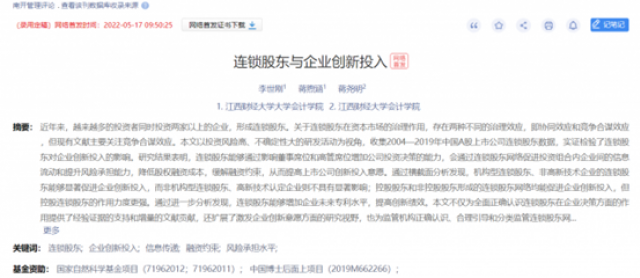|
|

Recently, a research achievement by Dr. Li Shigang from the School of Accounting was published in the domestic B+ journal Nankai Business Review, Issue 5, 2023. The title of the paper is "Interlocking Shareholders and Corporate Innovation Investment". Dr. Li Shigang is the first author, with co-authors including Dr. Jiang Xuhan (corresponding author) and Professor Jiang Yaoming from Jiangxi University of Finance and Economics. The paper takes the increasing number of investors simultaneously investing in two or more enterprises to form interlocking shareholders as the background, and examines the impact of interlocking shareholders on corporate innovation investment from the perspective of high-risk and uncertain R&D activities. The research results show that interlocking shareholders can increase the company's investment decision-making capacity by influencing board seats and executive seats. They promote information flow among portfolio companies through the interlocking shareholder network, enhance risk-taking ability, reduce equity financing costs, and alleviate financing constraints, thereby increasing listed companies' willingness to invest in innovation. Through cross-sectional analysis, it was found that institutional interlocking shareholders and interlocking shareholders of non-high-tech enterprises can significantly promote corporate innovation investment, while non-institutional interlocking shareholders and high-tech certified enterprises do not have a significant impact. Both interlocking shareholder networks formed by controlling shareholders and non-controlling shareholders can promote corporate innovation investment, but the effect of controlling interlocking shareholders is stronger. Further analysis reveals that interlocking shareholders can increase a company's future patent levels and improve innovation performance. This paper not only provides empirical evidence and incremental literature contributions for comprehensively and correctly understanding the role of interlocking shareholders in corporate decision-making, but also expands the research horizon in stimulating corporate innovation willingness. It also provides an important reference for regulatory agencies to correctly recognize, reasonably guide, and classify the role of interlocking shareholder networks in promoting corporate R&D investment. Journal Introduction: Nankai Business Review is an authoritative academic journal in management, aimed at publishing theoretical and empirical papers adhering to its special columns such as corporate governance, service marketing, innovation and entrepreneurship, and financial accounting. The journal's composite impact factor is 10.286 (2023 edition), and it is one of the Chinese authoritative B+ journals in the field of management disciplines at our university. Author Introduction: Li Shigang, born in November 1982 in Xinyang, Henan Province, holds a PhD in accounting and a postdoctoral degree in business administration. He is an associate professor and master's supervisor at the School of Accounting, Jiangxi University of Finance and Economics. He has been selected for the Jiangxi Accounting Leading Talent Cultivation Program (Phase IV) and the "Ganpo Talented Youth Support Plan - Leading Talent Cultivation Program in Universities". He has published over 30 papers in domestic important journals such as Accounting Research, Nankai Business Review, Audit Research, and Tax Research. He has hosted one National Natural Science Foundation project, one China Postdoctoral Special Funding Project, and one General Project, and hosted or participated in multiple provincial and ministerial-level projects such as the Ministry of Education's Humanities and Social Sciences Projects and Jiangxi Social Science Planning Projects. His main research areas include capital market accounting and financial issues. (Text and Photos/School of Accounting; Edited by Xiong Zijian; Reviewed by Jiang Ying (First Review), Zhao Yan (Second Review), and Li Dahui (Final Review)).
|
|







